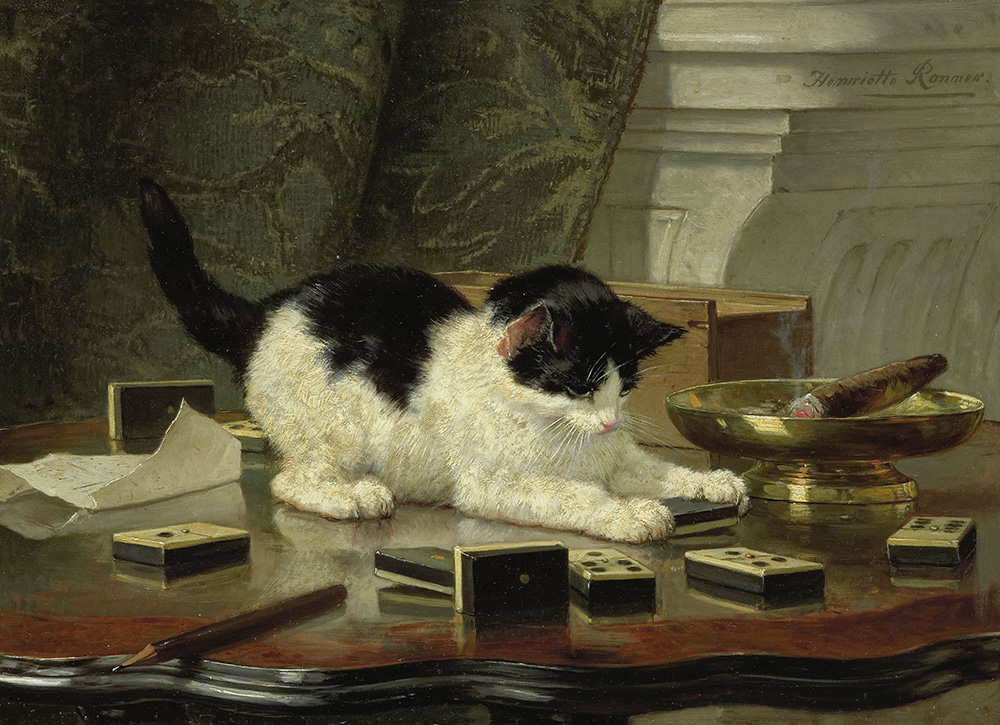
A Man Leaning on a Parapet, by Georges Seurat, c. 1881. The Metropolitan Museum of Art, bequest of Mrs. Charles Wrightsman, 2019.
For the rest of the year, Lapham’s Quarterly is running a series on the subject of history and the pleasures, pain, and knowledge that can be found from studying it. For more than fifty issues, contributors from antiquity to the present day have participated in millennia-spanning conversations on themes including friendship, happiness, death, and the future. But what did they make of the idea of studying the past in the first place? Check back every Thursday from now until the end of the year to read the latest.
“I like historians to be either very simple or excelling in worth,” Michel de Montaigne wrote in his essay “Of Books.”
The simple ones, who have not the wherewithal to add anything of their own, and who bring only care and diligence in collecting all that comes to their notice, and in registering everything honestly, without selecting and without sifting, leave our judgment unimpaired for discernment of the truth…The historians who excel in worth have the ability to select what deserves to be known; can choose of two reports that which is most probable; from the condition of princes and their humors they deduce their counsels and attribute to them fitting words. They have the right to assume authority to regulate our belief by their own; but certainly that belongs to very few.
Those between the two (which is the most common kind), they mar everything: they choose to prepare it all for us; they permit themselves to judge and, consequently, to bend history as they please; for when the judgment leans toward one side, it is not possible to keep from turning and twisting the narrative in that direction. They undertake to select the things worthy to be known, and often conceal from us some word, some private action, which would better inform us; they omit, as things not to be believed, those which they do not understand, and sometimes, perhaps, a thing because they do not know how to express it in good Latin or French. Let them boldly display their eloquence and their ideas; let them judge as they will; but let them also leave us the wherewithal to judge after them, and let them neither alter nor omit, by their abridgments and their selections, any part of the substance of their subject, but let them pass it on to us unchanged and complete in its every dimension. Most frequently there are selected for this office, and especially in these days, persons belonging to the common people, for the sole reason that they can express themselves well; as if we there sought instruction in grammar. And they are in the right (having been hired only for this, and having offered nothing for sale but mere talk) to concern themselves chiefly with that alone. Thus with many fine words they compose a fine mixture of the rumors they pick up in the public squares of cities.
The only good histories are those which have been written by the very men who were at the head of affairs, or who were participants in conducting them, or at least who had had the fortune to conduct others of the same sort.
“Among historians,” biographer Sarah Bakewell writes in How to Live, or A Life of Montaigne, “he liked Tacitus best, once remarking that he had just read through his History from beginning to end without interruption.”
He loved how Tacitus treated public events from the point of view of “private behavior and inclinations,” and was struck by the historian’s fortune in living through a “strange and extreme” period, just as Montaigne himself did. Indeed, he wrote of Tacitus, “you would often say that it is us he is describing.”
At the end of his essay “On the Force of Imagination,” he discusses his own methods of marshaling the past into an argument, as a would-be philosopher freed from the strictures of the self-avowed historian.

Someone saw lately at my home a cat watching a bird at the top of a tree; and after they had gazed fixedly at each other for some time, the bird let itself drop as if dead into the cat’s paws, either bewildered by its own imagination or drawn by some power of attraction in the cat. Those who like hawking have heard the story of the falconer who, fixing his eyes persistently on a kite in the air, wagered that he would bring it down simply by the power of his eyes, and did it, so they say.
For the anecdotes that I borrow, I refer them to the consciences of those from whom I receive them; the inferences are my own, and are derived from the evidence of common sense, not of experience; everyone can add his own examples, and let him who has none not fail to believe that there are plenty of them, because of the number and variety of the chances. If I do not rightly comment on them, let another comment for me. In the study that I enter upon of our manners and acts, fabulous testimonies, provided that they are possible, serve as well as true ones. Whether it really happened or not, at Rome or at Paris, to Peter or to John, it is always an illustration of what is contained in men’s minds, of which I am advantageously informed by the tale. I see it and profit by it, whether it be a shadow or a solid body. And of the different forms that histories often contain, I make use of that which is most unusual and memorable. There are authors whose object it is to narrate real events. Mine, if I should be able to attain it, would be to tell of what is possible to happen. The schools are rightly permitted to imagine examples when they have none. I do not do so, however, and in that respect I surpass in scrupulous conscientiousness all the fidelity of historians. In the examples which I here derive from what I have heard, done, or said, I have forbidden myself to venture to change even the most trivial and unimportant details. Consciously I do not falsify one iota; unconsciously, I cannot say.
It sometimes comes into my mind about this matter, how it can be that it well befits a theologian, a philosopher, and suchlike persons of delicate and accurate conscience and prudence to write history. How can they rest their faith on a popular faith? How be responsible for the thoughts of unknown persons and put forth their conjectures as of value? About actions with diverse phases that take place in their presence, they would refuse to give evidence sworn to before a magistrate, and they know no man so intimately that they would be ready to answer fully regarding his intentions. I hold it less hazardous to write of past than of present matters, inasmuch as the writer then has only to produce a borrowed assertion. Some people urge me to write of the affairs of my own time, judging that I view them with eyes less impaired by passion than other men, and at closer quarters, because of the access that fortune has given me to the chiefs of different parties. But they do not recognize that I would not, for the fame of Sallust, take the trouble to do this, being a sworn foe to obligation, to assiduity, to perseverance; that there is nothing so contrary to my style as a long narrative, I am stopped short so often by lack of breath; I have no skill in composition or exposition; I am more ignorant than a child of the words and phrases used for the commonest things. Therefore I have undertaken to say what I know how to say, accommodating the matter to my powers; if I should take a subject to be followed up, my measure might fall short of my topic; and were my liberty so free, I might publish opinions that, even according to my own judgment and to reason, are unlawful and punishable. Plutarch would readily acknowledge, concerning what he wrote, that it is due to others if his examples are wholly and always true; if they are profitable to posterity and presented with a brilliancy that lights our way to virtue, that is due to him. It is not of importance in an ancient tale, as it is in a medicinal drug, that it should be thus or thus.
Read the other entries in this series: Polybius, Niccolò Machiavelli, Thomas Hardy, Etsu Inagaki Sugimoto, Voltaire, Charles Lamb, al-Biruni, Ibn Khaldun, Germaine de Staël, and Agnes Strickland and Elizabeth Strickland.